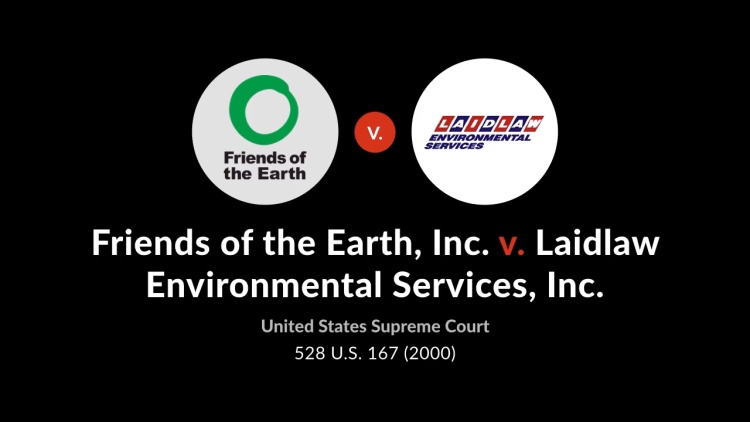Friends of the Earth, Inc. v. Laidlaw Environmental Services, Inc.
United States Supreme Court
528 U.S. 167 (2000)
- Written by Jamie Milne, JD
Facts
Laidlaw Environmental Services, Inc. (Laidlaw) (defendant) operated a waste facility and obtained a National Pollutant Discharge Elimination System (NPDES) permit to discharge certain pollutants into a nearby river. Laidlaw repeatedly exceeded the permit’s limit for mercury discharges. Friends of the Earth and other environmental groups (collectively, FOE) (plaintiffs) notified Laidlaw of their intent to sue for violation of the Clean Water Act (CWA). After the CWA’s 60-day waiting period, FOE filed suit, seeking both injunctive relief requiring compliance and the imposition of civil monetary penalties for Laidlaw’s noncompliance. Affidavits from FOE members stated that their ability to enjoy the river for recreational purposes was diminished because of concerns from Laidlaw’s pollution. Laidlaw argued that (1) FOE lacked standing because it had not incurred any injury and (2) the suit was moot because, after filing but before trial, Laidlaw became substantially compliant with its permit. Because Laidlaw was presently compliant, the district court deemed injunctive relief inappropriate. The court did, however, award civil penalties for past noncompliance. The parties appealed only as to the civil penalties. The court of appeals concluded that the case had become moot because Laidlaw voluntarily ceased the offending conduct and civil penalties would not address any injury FOE had suffered. It therefore remanded with instructions to dismiss the case. Between that decision and the United States Supreme Court’s grant of certiorari, Laidlaw closed the offending facility. The Supreme Court considered both standing and mootness.
Rule of Law
Issue
Holding and Reasoning (Ginsburg, J.)
Concurrence (Stevens, J.)
What to do next…
Here's why 904,000 law students have relied on our case briefs:
- Written by law professors and practitioners, not other law students. 47,100 briefs, keyed to 995 casebooks. Top-notch customer support.
- The right amount of information, includes the facts, issues, rule of law, holding and reasoning, and any concurrences and dissents.
- Access in your classes, works on your mobile and tablet. Massive library of related video lessons and high quality multiple-choice questions.
- Easy to use, uniform format for every case brief. Written in plain English, not in legalese. Our briefs summarize and simplify; they don’t just repeat the court’s language.





